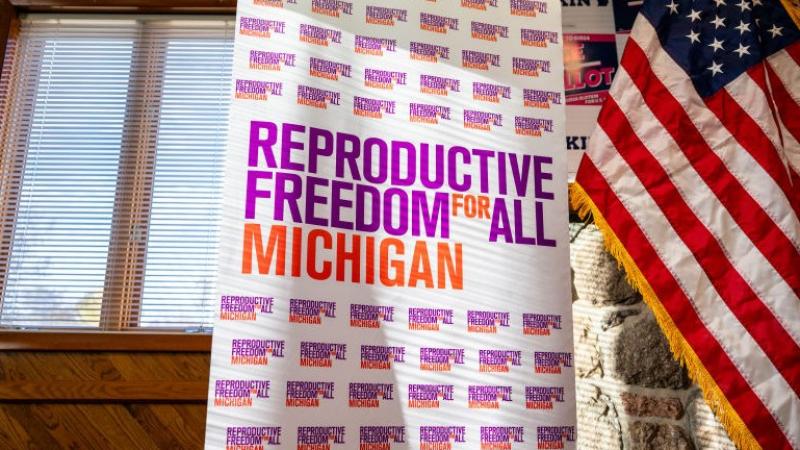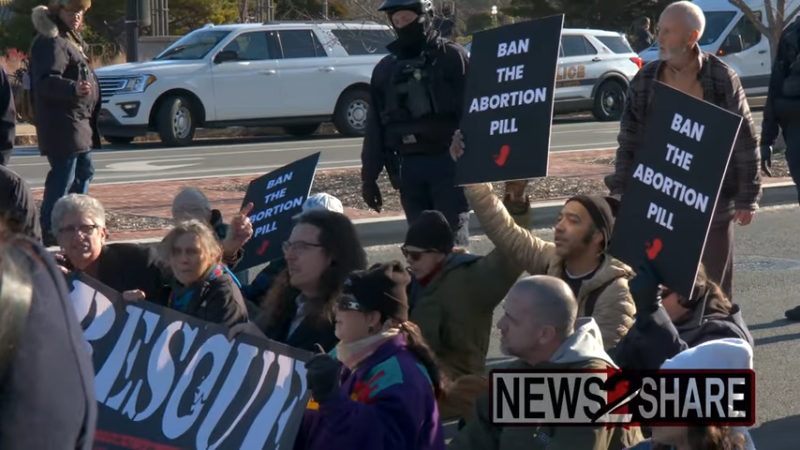'Do you think the FDA is infallible?' SCOTUS mulls leaving feds unaccountable in abortion drug case
Feds argue against legal standing for anyone to challenge their decisions, whether making mifepristone easier to get or pressuring social media to censor disfavored narratives, Justice Alito says.
"Do you think the FDA is infallible?"
That question from Supreme Court Justice Samuel Alito hung over oral argument Tuesday in a medical association's challenge to the Food and Drug Administration's loosening of access rules for abortion drug mifepristone, pitting the justices' wariness of expanding legal standing with its fear of leaving the agency to its own devices.
Between 2016 and 2021, the FDA expanded mifepristone's gestational window from 7 to 10 weeks, removed mandatory reporting of non-fatal adverse events and most recently allowed mail-order of the drug, made by Danco, without an in-person visit.
The Alliance for Hippocratic Medicine is representing seven practicing doctors who argue those changes will make them "complicit" in the process of abortions, violating their consciences, because more women will suffer "serious adverse events" (SAEs) and go to emergency rooms, where alliance members may have to "complete" abortions to save the women.
The 5th U.S. Circuit Court of Appeals upheld a lower court's determination that the FDA's changes violated the Administrative Procedure Act (APA), but neither ruling took effect.
The agency did not consider "the cumulative effect of removing several important" and "interrelated" safeguards on access "at the same time," which could change mifepristone's risk profile, or gather evidence that it could be safely taken "without being prescribed and dispensed in person," the appeals court said last summer.
Solicitor General Elizabeth Prelogar and Danco lawyer Jessica Ellsworth each tried to evade the question of who could hold the FDA accountable for bad decisions, emphasizing the agency conducted an "exhaustive examination" and "exhaustively considered the evidence" for its mifepristone revisions.
Justice Clarence Thomas said Prelogar's claim, that the AHM doctors "stand at a far distance" from suffering "concrete harm," sounds like "sort of a criticism" of SCOTUS precedents on associational and organizational standing.
"They're the kinds of allegations we see by immigration advocacy groups," Justice Amy Coney Barrett said, that "diversion of resources" and "increased expenses" from policy changes give them standing. The 9th Circuit upheld such standing in a challenge to Trump administration immigration policy changes.
Alito pressed the solicitor general to name any category with standing, such as a pro-life ER doctor who would have to abort a viable fetus to save a woman's life.
"That situation has never come to pass" since mifepristone's 2000 approval and is "unduly speculative," Prelogar said. "Even if there is no alternative," the courts must observe Article III standing rules.
So if the FDA "flagrantly violated the law ... it's just too bad?" Alito asked. He compared Prelogar's argument Tuesday to her argument last week, that no one had standing to challenge White House pressure on social media platforms to censor disfavored narratives.
Alito also grilled Danco's Ellsworth on what harm the drug maker would suffer if the 5th Circuit decision took effect, given that mifepristone would remain available under earlier restrictions. "You think you're going to sell more" otherwise?, he asked.
It would stop the sale "in line with FDA's scientific judgment about the safe and efficacious use of the drug," Ellsworth answered.
Justice Ketanji Brown Jackson helped Ellsworth by asking whether courts have "specialized scientific knowledge" to question agency decisions.
Courts have relied on studies that were "an analysis of anonymous blog posts" and "retracted for lack of scientific rigor and for misleading presentations of data," Ellsworth responded. "Those sorts of errors can infect judicial analyses precisely because judges are ... not experts in statistics."
Chief Justice John Roberts pressed Prelogar and Ellsworth separately on how much mifepristone SAEs would have to increase under the FDA revisions for the doctors to have standing.
"It's hard for me to imagine that it could" change the standing analysis because it "turns on so many different intervening events separated by independent decisions," Prelogar said. Ellsworth said the "attenuated chain of circumstances involving third-party decisions that have to play out in a particular way" makes the alleged injury "hypothetical or conjectural."
Prelogar may have made her upcoming SCOTUS oral argument against Idaho's abortion restrictions more difficult by emphasizing that doctors already have conscience protections against abortion participation.
Barrett noted the 5th Circuit criticized the feds for "inconsistent positions" on the Emergency Medical Treatment and Active Labor Act, claiming in the FDA case it does not require doctors to perform abortions in emergencies, but in Idaho and Texas cases that it does.
Prelogar said the 5th Circuit "fundamentally misunderstood our arguments" and agreed with Barrett that EMTALA protections apply to doctors even in a "healthcare desert." The emergency-abortion obligation applies to hospitals, which "often" ask doctors to state their conscience objections "in advance" to make sure someone else can perform an abortion.
AHM lawyer Erin Hawley of Alliance Defending Freedom, which is also defending Idaho's law against Prelogar, said the issue was an APA slam dunk.
The FDA admitted its data was "not adequate" to judge the safety of mifepristone-by-mail, that 2.9-4.6% of women "will end up in the emergency room," that 3.1% of pregnancies will be "ongoing" with the gestational increase to 10 weeks, and up to 7% will need "surgical interventions" without an in-person visit, she told justices.
Denying standing lets the feds "conscript non-regulated parties into violating their consciences and suffering other harm without judicial recourse" and forcing pro-life doctors into a "Hobson's choice," according to Hawley, the wife of Sen. Josh Hawley, R-Mo.
Thomas questioned how Hawley's basis for AHM's standing – having to "divert resources from speaking and advocating for their pro-life mission" to challenge the harms of abortion drugs – would not also enable anyone "who is aggressive or vigilant about bringing lawsuits."
Justices Jackson and Neil Gorsuch ganged up on Hawley for the breadth of relief she was seeking compared to the alleged harm caused to seven doctors, only two of whom specified their conscience objections.
Why should "no one else in America … have this drug in order to protect your clients?" Jackson asked.
Gorsuch interrupted as Hawley answered, noting that courts issued "zero universal injunctions" during the 12-year Franklin Roosevelt presidency but "something like 60" in the past few years. He fears turning "a small lawsuit into a nationwide legislative assembly" on any federal action.
Hawley repeatedly returned to the emergency nature of the procedure, when a doctor doesn't know whether a patient's life-threatening complication is "a miscarriage, an ectopic pregnancy, or an elective abortion" and may not be able to find a colleague willing to perform an abortion.
Like Prelogar, the Democratic-appointed justices told Hawley the doctors could simply state their conscience objections ahead of time so hospitals could work around them.
Barrett and Jackson additionally questioned whether the doctors' consciences were really violated if they weren't aborting a viable fetus, since none attested they had done that in an emergency. They've had to "scrape out" aborted fetuses, which is still complicity in abortion, Hawley said.
Editor's note: Alliance Defending Freedom is an advertising sponsor of the Just the News podcast network, including "John Solomon Reports," where it seeks donations for its nonprofit legal work.
















